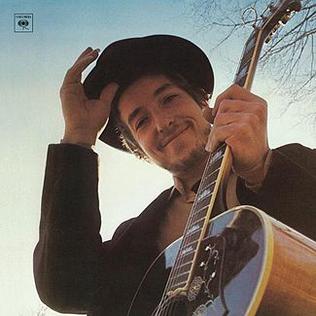
Nashville Skyline is the ninth studio album by the American singer-songwriter Bob Dylan, released on April 9, 1969, by Columbia Records as LP record, reel-to-reel tape and audio cassette.
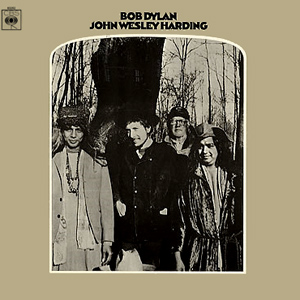
John Wesley Harding is the eighth studio album by the American singer-songwriter Bob Dylan, released on December 27, 1967, by Columbia Records. Produced by Bob Johnston, the album marked Dylan's return to semi-acoustic instrumentation and folk-influenced songwriting after three albums of lyrically abstract, blues-indebted rock music. John Wesley Harding was recorded around the same time as the home recording sessions with The Band known as The Basement Tapes.

The Rolling Thunder Revue was a 1975–76 concert tour by American singer-songwriter Bob Dylan with numerous musicians and collaborators. The purpose of the tour was to allow Dylan, who was a major recording artist and concert performer, to play in smaller auditoriums in less populated cities where he could be more intimate with his audiences.

The Bootleg Series Vol. 5: Bob Dylan Live 1975, The Rolling Thunder Revue is a live album by Bob Dylan released by Columbia Records in 2002. The third installment in the ongoing Bob Dylan Bootleg Series on Legacy Records, it documents the Rolling Thunder Revue led by Dylan prior to the release of the album Desire. Until the release of this album, the only official live documentation of the Rolling Thunder Revue was Hard Rain, recorded during the less critically well received second leg of the tour.
"Shelter from the Storm" is a song by Bob Dylan, recorded on September 17, 1974, and released on his 15th studio album, Blood on the Tracks, in 1975. It was later anthologized on the compilation album The Essential Bob Dylan in 2000.

"Lay Lady Lay", sometimes rendered "Lay, Lady, Lay", is a song written by Bob Dylan and originally released in 1969 on his Nashville Skyline album. Like many of the tracks on the album, Dylan sings the song in a low croon, rather than in the high nasal singing style associated with his earlier recordings. The song has become a standard and has been covered by numerous bands and artists over the years.
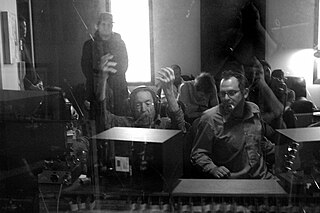
Donald William "Bob" Johnston was an American record producer, best known for his work with Bob Dylan, Johnny Cash, Leonard Cohen, and Simon & Garfunkel.
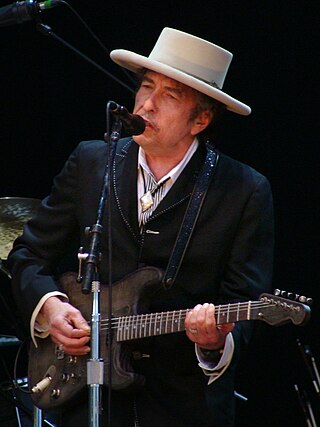
Bob Dylan is an American singer-songwriter. Often considered to be one of the greatest songwriters in history, Dylan has been a major figure in popular culture over his 60-year career. He rose to prominence in the 1960s, when his songs "Blowin' in the Wind" (1963) and "The Times They Are a-Changin'" (1964) became anthems for the civil rights and antiwar movements. Initially modeling his style on Woody Guthrie's folk songs, Robert Johnson's blues, and what he called the "architectural forms" of Hank Williams's country songs, Dylan added increasingly sophisticated lyrical techniques to the folk music of the early 1960s, infusing it "with the intellectualism of classic literature and poetry". His lyrics incorporated political, social, and philosophical influences, defying pop music conventions and appealing to the decade's burgeoning counterculture.
"Simple Twist of Fate", a song by American singer-songwriter Bob Dylan, was recorded on September 19, 1974, and was released in 1975 as the second song on his 15th studio album Blood on the Tracks.
"One Too Many Mornings" is a song by Bob Dylan, released on his third studio album The Times They Are a-Changin' in 1964. The chords and vocal melody are in some places very similar to the song "The Times They Are A-Changin'". "One Too Many Mornings" is in the key of C Major and is fingerpicked.
"Tears of Rage" is a song with lyrics written by Bob Dylan and music by Richard Manuel. Dylan and the Band first recorded the song in 1967, but it was not released until 1975 on The Basement Tapes album. In 1968, the Band recorded it for their debut album Music from Big Pink.
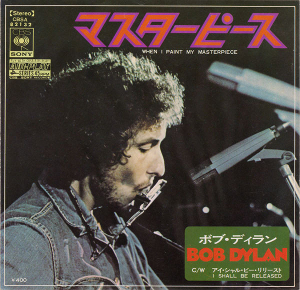
"When I Paint My Masterpiece" is a 1971 song written by Bob Dylan. It was first released by The Band, who recorded the song for their album Cahoots, released on September 15, 1971.

"Watching the River Flow" is a blues rock song by American singer Bob Dylan. Produced by Leon Russell, it was written and recorded during a session in March 1971 at the Blue Rock Studio in New York City. The collaboration with Russell formed in part through Dylan's desire for a new sound—after a period of immersion in country rock music—and for a change from his previous producer.
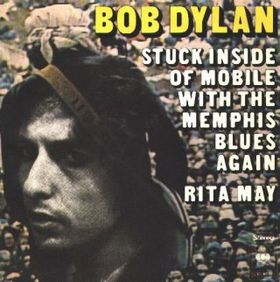
"Rita May" is a song by Bob Dylan, originally recorded during the sessions for the album Desire, but released only as the B-side of a single and on the compilation album, Masterpieces. The song is based on the 1957 rockabilly song "Bertha Lou". Some listeners believe that the lyrics of the song refer to writer Rita Mae Brown, who had complained of the lack of opportunities for casual lesbian sex.
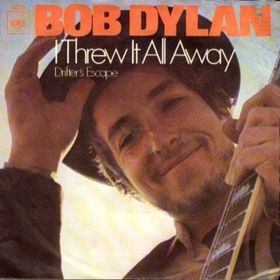
"I Threw It All Away" is a song by American singer-songwriter Bob Dylan. The track appeared on Dylan's album Nashville Skyline in 1969, and was released as its first single later that year, where it reached number 85 on the Billboard Hot 100, and number 30 on the UK Singles Chart. It is considered to be one of the best and most popular songs on the album.
"To Be Alone with You" is a country-rock song by American singer-songwriter Bob Dylan, released as the third track on his 1969 album Nashville Skyline.
"Mama, You Been on My Mind" is a song by American singer-songwriter Bob Dylan. Written in 1964 during a trip to Europe, the song dealt with his recent breakup with his girlfriend, Suze Rotolo. Dylan first recorded the song in June of that year during a session for his album Another Side of Bob Dylan. However, the song was not included on the album, and Dylan's version remained unreleased until 1991. In total, in the 1990s and 2000s four versions were put out on Dylan's Bootleg Series of releases, including two live performances with Joan Baez from 1964 and 1975.
Bob Dylan is an American musician, singer-songwriter, music producer, artist, and writer. He has been an influential figure in popular music and culture for more than five decades. Much of his most celebrated work dates from the 1960s when he was an informal chronicler and a seemingly reluctant figurehead of social unrest.
"Sara" is a song from Bob Dylan's 1976 album Desire. It is the closing song on the album. Unlike many of the songs on the album, which were written by Dylan and Jacques Levy, "Sara" was written solely by Dylan, as an autobiographical account of his estrangement from then-wife Sara Dylan. It was recorded on July 31, 1975.
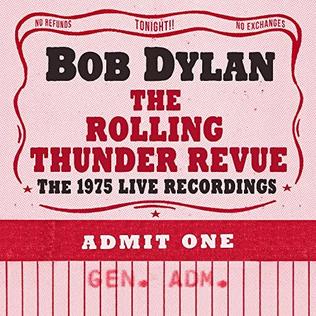
Bob Dylan – The Rolling Thunder Revue: The 1975 Live Recordings is a box set of 1975 live recordings by Bob Dylan, released on June 7, 2019. For this tour, Dylan assembled a loose collective of a backing band called Guam and played across North America for several dozen shows. The tie-in Netflix documentary film Rolling Thunder Revue: A Bob Dylan Story by Martin Scorsese was released the following week. A similar compilation was released in 2002 entitled Bob Dylan Live 1975, The Rolling Thunder Revue, as part of Dylan's ongoing Bootleg Series. That compilation was re-released on vinyl as a companion to the later release.












